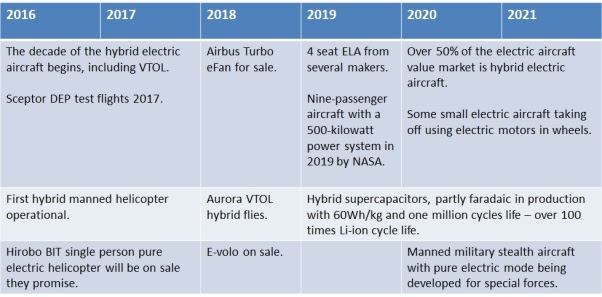It is now clear that the MEA business will be around $24 billion as soon as 2020 but the new analysis by IDTechEx sees truly hybrid and pure electric aircraft being a $24 billion business in 2031.
Manned Electric Aircraft 2016-2031
Peter Harrop | IDTechEx
The unique new IDTechEx Research report “Manned Electric Aircraft 2016-2031” explains how, so far, electric aircraft have largely followed electric land and water vehicles. Pure electric small ones appeared first, about 50 years after the first electric boats and cars. Hybrid ones are needed for the longer distances and tougher duty cycles and only now are these getting serious investment. The delays are only partly explained by the tougher demands and regulatory requirements of aircraft. In 2016, Siemens and Airbus agreed to pool 200 engineers to work on them, the level of effort Toyota allotted to hybrid cars twenty years earlier, with major commercial success resulting today. Toyota enjoys well over $20 billion dollars of sales of electric cars, buses and forklifts with Honda and BMW successful too – interesting because all three are now in aircraft. Indeed, Google and Facebook are involved in electric cars and aircraft and Apple is interested so it is wake up time.
The major aerospace companies have not been idle. Although they have done little in the genuinely pure electric and hybrid electric aircraft arena beyond flying a few innovative prototypes, leaving it to small companies making small craft, they have invested billions in coming at it from the top end in the form of the “More Electric Aircraft (MEA)” meaning airliners that are progressing in the direction of electric powertrains. The considerable commercial success of the 787 Dreamliner makes Boeing the winner of the first round of the MEA battle, something that will evolve into hybrid and pure electric airliners in 15-20 years they foresee. The giants also invest heavily in unmanned aircraft and some of this technology will benefit manned flight, the subject of the new report.
Timeline of manned electric aircraft technology 2016-2021

Source: IDTechEx Research
It is now clear that the MEA business will be around $24 billion as soon as 2020 but the new analysis by IDTechEx sees truly hybrid and pure electric aircraft being a $24 billion business in 2031. Half of that will be relatively low priced craft such as leisure and small work aircraft and the high priced half will be a mix of such things as helicopters, military aircraft and feeder aircraft according to IDTechEx projections, with large airliners not quite there. Indeed large pure electric airliners would rely on legislation even when feasible because they would be slow. The new report, “Manned Electric Aircraft 2016-2031” gives a detailed technology roadmap and sales forecasts for all this with specifications of actual and planned aircraft along the way.
“Manned Electric Aircraft 2016-2031” reveals how much of this will no longer be a reworking of land-based technology but be based on such things as superconducting power distribution and traction motors with at least four times the kW/kg and Distributed Electric Propulsion (DEP) along the full length of the wing. However, new concepts being progressed first on land such as supercapacitor bodywork and some other structural electronics may have a place in these new ultra-lightweighted aircraft.
The report looks a little at the past and a lot at the present and future of electric aircraft both hybrid and pure electric. IDTechEx researchers do not write as enthusiasts or publicists but rather seek to give the unalloyed truth as independent analysts. Unusually, to see manned aircraft in context, IDTechEx links its analysis to the whole electric vehicle business, which includes electric vehicles EVs (pure electric or hybrid) for land, water and air including unmanned aircraft. This is because there is huge scope for cross fertilising and standardising approaches and technologies in both directions. These markets are merging and experiencing disruptive entry by outsiders. For example, Elon Musk of Tesla and SpaceX has expressed interest in making electric aircraft. Google and Apple target electric cars and Google and Facebook develop unmanned electric aircraft. Siemens now makes traction motors for land, water and airborne electric vehicles. Several manufacturers are profiled that are now spanning several modes and the subject is brought alive by latest interviews and presentations from the leaders and profiles of exciting new and planned electric aircraft. There is also a close look at key components of the future such as hybrid supercapacitors, batteries that will follow lithium-ion, new motors, power components, structural electronics and the technology of energy independent vehicles, including aircraft. Much more than consolidation of information out there, this report is also unique in being researched almost entirely in 2016 and constantly updated, most of its information and facts-based analysis being unavailable on the web. It is the fruit of intensive worldwide travel and interviews by PhD level analysts.
For more see www.IDTechEx.com/aircraft.
About IDTechEx
IDTechEx guides your strategic business decisions through its Research and Events services, helping you profit from emerging technologies. We provide independent research, business intelligence and advice to companies across the value chain based on our core research activities and methodologies providing data sought by business leaders, strategists and emerging technology scouts to aid their business decisions.
Learn more at www.IDTechEx.com and to discuss your needs please contact us on research@IDTechEx.com.
The content & opinions in this article are the author’s and do not necessarily represent the views of AltEnergyMag
Comments (0)
This post does not have any comments. Be the first to leave a comment below.
Featured Product

